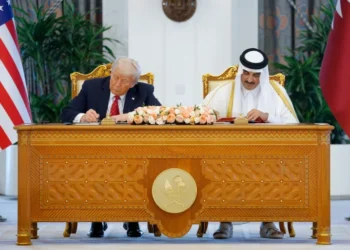A new global corruption index has revealed a troubling decline in anti-corruption efforts across several key nations, marking the worst performance in more than a decade for many.
Transparency International, the organization behind the annual Corruption Perceptions Index, reported that 47 out of 180 surveyed countries recorded their lowest scores since the current ranking system was introduced in 2012.
The index, which evaluates public sector corruption based on data from sources such as the World Bank and the World Economic Forum, scores nations on a scale from 0 (highly corrupt) to 100 (very clean).
According to the latest report, “global corruption levels remain alarmingly high, with efforts to reduce them faltering.”
The global average on the index has remained unchanged at 43, highlighting the need for urgent action against corruption.
Several Western nations saw notable declines. The United States dropped from 69 to 65 points, falling from 24th to 28th place, with Transparency International citing concerns over judicial independence and “the lack of meaningful, objective enforcement mechanisms” in the U.S. Supreme Court’s new ethics code.
France also saw a decline, slipping four points to 67 and five places to 25th, while Germany fell three points to 75, tying with Canada.
Mexico experienced one of the sharpest declines, losing five points to reach 26, as its judiciary faced criticism for failing to address major corruption cases. Despite former President Andrés Manuel López Obrador’s pledges to combat corruption, Transparency International reported that his term ended “without any convictions or recovered assets.”

Slovakia also registered a significant drop, losing five points to 49 under Prime Minister Robert Fico’s leadership, as reforms reportedly undermined anti-corruption checks and bypassed public consultation.
Denmark Leads, South Sudan Ranks Last
While corruption levels worsened in many nations, Denmark maintained its position at the top of the index with an unchanged score of 90, followed closely by Finland (88) and Singapore (84). New Zealand slipped to fourth place after dropping two points to 83.
At the opposite end of the spectrum, South Sudan recorded the worst performance with just eight points, displacing Somalia, which fell to nine. Venezuela followed closely with 10 points, while Syria registered a score of 12.
Transparency International highlighted how corruption hinders global initiatives, particularly climate change efforts. It warned that a “lack of transparency and accountability” increases the risk of climate funds being misused, while “undue influence” from private sector interests obstructs meaningful policy implementation.
In Russia, corruption levels continued to deteriorate, with the country dropping four points to 22. The organization linked this decline to the “further entrenchment of authoritarianism” following Moscow’s full-scale invasion of Ukraine in 2022.
While Ukraine’s score dipped slightly to 35, Transparency International noted that the country “is making strides in judicial independence and high-level corruption prosecutions.”
The Middle East and North Africa remained among the most corruption-plagued regions, where political leaders maintain tight control over wealth and power while suppressing dissent.
However, the report pointed to emerging opportunities, particularly following the weakening of President Bashar Assad’s regime in Syria.
Sub-Saharan Africa recorded the lowest regional average, at just 33 points. Similarly, in Asia and the Pacific, Transparency International observed that governments “are still failing to deliver on anti-corruption pledges.”
Despite ongoing efforts to combat corruption, the latest report underscores a grim reality: many governments are either unable or unwilling to tackle systemic corruption effectively.
With public trust in institutions at risk, experts warn that failing to address these issues could further destabilize economies and governance worldwide.




















